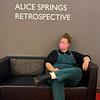Take a photo of a barcode or cover
4.5/5
No poem will ever be better than solitude 72:
“you can cut my dick right off / if it means the sun will rise in my mouth”
No poem will ever be better than solitude 72:
“you can cut my dick right off / if it means the sun will rise in my mouth”
The poems in Fiston Mwanza Mujila's The River in the Belly (translated from French by J. Bret Maney) revolve around the Congo River but also adds other bodies of waters, themes of exile and rememberance.
The Congo River here is not a romanticized place, but appears as object and subject of a violent history and present, of colonial and post-colonial exploitation, the river as a witness - but with agency. Mujila even laments in one of the poems even: "its complicit silence/ makes me sick...".
Having "the river in the belly" as the title puts it is not a serene image of belonging but it is troubling: A lot of the imagery evolves around sickness, nauseau, and yes, diarrhea. The poems in their entirety built up to a visceral depiction of the effects of violence and trauma accross generations - and the position of the exiled writer in the mids of that.
"as the river offs itself in the ocean
I go off to spill my guts"
If you have read Fiston Mwanza Mujila's Tram 83 you know that his style is very musical - and that is true for many of these poems too. Would love to hear them read aloud by Mujila. I did find some of the imagery (and phrasings) a bit repetitive (and not as in echoes and adding layers). There were also some gendered images I found more irksome.
All the poems are called "Solitude" and numbered (some have additional title lines). The blurb describes solitude as "a short poetic form lending itself to searing observation and troubled humour, prone to unexpected tonal shifts and lyrical U-tone". I wasn't convinced by this framing as the poems do not necessarily follow a very specific form. There are a lot of more short form poems but there are also substantially longer ones which are also called "Solitude". I just did not see the specific causality between form and content implied by the blurb. What I found more interesting was that the poems are numbered but they are not presented from the lowest to the highest number but seemingly mixed. I read the book from front to back but I would be interested to re-read the collection and read them by number to see if that opens new connections and layers.
The Congo River here is not a romanticized place, but appears as object and subject of a violent history and present, of colonial and post-colonial exploitation, the river as a witness - but with agency. Mujila even laments in one of the poems even: "its complicit silence/ makes me sick...".
Having "the river in the belly" as the title puts it is not a serene image of belonging but it is troubling: A lot of the imagery evolves around sickness, nauseau, and yes, diarrhea. The poems in their entirety built up to a visceral depiction of the effects of violence and trauma accross generations - and the position of the exiled writer in the mids of that.
"as the river offs itself in the ocean
I go off to spill my guts"
If you have read Fiston Mwanza Mujila's Tram 83 you know that his style is very musical - and that is true for many of these poems too. Would love to hear them read aloud by Mujila. I did find some of the imagery (and phrasings) a bit repetitive (and not as in echoes and adding layers). There were also some gendered images I found more irksome.
All the poems are called "Solitude" and numbered (some have additional title lines). The blurb describes solitude as "a short poetic form lending itself to searing observation and troubled humour, prone to unexpected tonal shifts and lyrical U-tone". I wasn't convinced by this framing as the poems do not necessarily follow a very specific form. There are a lot of more short form poems but there are also substantially longer ones which are also called "Solitude". I just did not see the specific causality between form and content implied by the blurb. What I found more interesting was that the poems are numbered but they are not presented from the lowest to the highest number but seemingly mixed. I read the book from front to back but I would be interested to re-read the collection and read them by number to see if that opens new connections and layers.
informative
reflective
slow-paced
challenging
dark
inspiring
reflective
sad
medium-paced
slow-paced
inspiring
reflective
medium-paced
https://timothyotte.substack.com/p/the-river-in-the-belly






